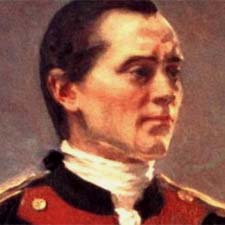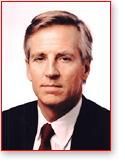| Evan Thomas on John Paul Jones |

JOHN PAUL JONES
Captain Jones has inspired scores of biographies since he burst into history
during the American revolution. Evan Thomas has managed to capture both the latest
scholarship and the elusive personality of the well-known, but rarely understood
hero. Before his visit to SeacoastNH.com in Portsmouth, we talked to Evan Thomas
by phone.
An Interview with Evan Thomas,
Thomas, 51, an assistant managing editor at Newsweek magazine, took a short sabbatical
to complete the book. His new analysis of Captain Jones will appear next year,
and is the first major biography of Jones since the classic work by naval historian
Samuel Eliot Morison in 1959. A well-known reporter and media commentator who
was also an editor at Time, Thomas has written a number of political science books
including a recent biography of Robert Kennedy. The author's father is best known
as the publisher of "Profiles in Courage" by John F. Kennedy. SeacoastNH.com editor J. Dennis Robinson talked with Thomas about his upcoming
book "John Paul Jones: Sailor, Hero and Father of the American Navy" that will
be released by Simon & Schuster in June 2003. Following are excerpts from
their recent conversation.
A Conversation with Evan Thomas
SEACOASTNH.com:
SEACOASTNH.com:
EVAN THOMAS:
SEACOASTNH.com:
EVAN THOMAS:
SEACOASTNH.com:
EVAN THOMAS:
SEACOASTNH.com:
EVAN THOMAS:
SEACOASTNH.com
EVAN THOMAS:
SEACOASTNH.com
EVAN THOMAS:
SEACOASTNH.com:
EVAN THOMAS:
We're lucky that, as a self-promoter, Jones left an awful lot of his papers that
are reasonably accurate, although like most self-promoters he gilds the lily a
bit. Compared to other naval and Revolutionary figures -- that's a lot of paper
-- and that's one reason why his legend has survived. SEACOASTNH.com:
EVAN THOMAS:
SEACOASTNH.com:
EVAN THOMAS:
SEACOASTNH.com:
EVAN THOMAS:
SEACOASTNH.com:
EVAN THOMAS:
SEACOASTNH.com:
EVAN THOMAS:
SEACOASTNH.com:
EVAN THOMAS:
SEACOASTNH.com:
EVAN THOMAS:
His men are always mutinying. It happens again and again. That's not entirely
Jones' fault. Your crowd from Portsmouth [on the Ranger] wanted to have town meeting.
They weren't ready for British naval discipline. They wanted to vote before they
went out. SEACOASTNH.com:
EVAN THOMAS:
SEACOASTNH.com
EVAN THOMAS:
SEACOASTNH.com:
EVAN THOMAS:
SEACOASTNH.com:
EVAN THOMAS:
SEACOASTNH.com:
EVAN THOMAS:
SEACOASTNH.com:
EVAN THOMAS:
SEACOASTNH.com
EVAN THOMAS:
SEACOASTNH.com:
EVAN THOMAS:
SEACOASTNH.com:
EVAN THOMAS:
Herman Melville even says so. He describes America as "the Paul Jones of nations."
He wrote about Jones as, and I quote: "Intrepid, unprincipled, reckless, predatory,
with boundless ambition, civilized in externals but a savage at heart." Copyright © 2003 by J. Dennis Robinson. All rights reserved.
Newsweek editor and author of
 JOHN PAUL JONES: Sailor, Hero Father
JOHN PAUL JONES: Sailor, Hero Father
of the American Navy (2003)
Simon & Schuster
CLICK TO BUY from Amazon.com
For 200 years biographers have been retelling the tales of larger-than-life naval hero John
Paul Jones. Praised, then forgotten, revived and all but canonized, emulated and
despised -- Jones continues to serve his country as a sort of American Rorsharsch
Test. Each generation sees Jones in its own light. In his upcoming book Evan Thomas
will redefine Jones for the 21st century, portraying him as the first American action hero, a self-made man and
a complex, moody figure worthy of yet another look.
This interview copyright © 2003 SeacoastNh.com.
All rights reserved.
Photo Credit of Simon & Schuster
Why Jones?
 EVAN THOMAS:
EVAN THOMAS:
Really for notions of childhood romance. When I was growing up in the 1950s,
he was a very romantic figure. My father had been a lieutenant JG in the Navy
(in WW2) and to his generation Jones is a romantic. So that created a lifelong
curiosity in him. It was a book I'd always wanted to write, and I finally got
a chance to write it.
Until recently, we've not seen books about the American Revolution on the bestseller
list.
My publisher used to tease me and say -- Why don't you wait for your retirement
for that one? The weather changed a couple of years ago…because of David McCullough's
book on John Adams and because of Joseph Ellis's book "Founding Brothers", the
movie "The Patriot" with Mel Gibson, and just a general resurgence of patriotism.
But isn't that ironic? Was Jones, a Scottish soldier of fortune, really an American
patriot?
I would argue that he is mostly interested in himself. He's a very very self-absorbed
glory seeker. But I wouldn't totally discount the patriotism, because he saw America
as a place where you could be self-made. He was a gardener's son. I think he was
condescended to by Royal Navy Captains when he was in London in the early 17000s
and the lord of manor was snotty to his father. He has a lot of patriotic language
in his letters -- about being proud to raise the American flag on the deck of
the Alfred when the first ship was commissioned.
Didn't Jones get the same treatment when he was in Portsmouth, NH?
He certainly got the same treatment in Virginia and I think the first time around
in Portsmouth. He and John Langdon fight, but Jones ingratiates himself with the
local gentry. I gather from reading other books that Portsmouth had a very big-time
gentry. Gordon Wood, a very good colonial scholar, writes that outside of Virginia,
it had the most established colonial aristocracy. By the time Jones returns to
Portsmouth for the [warship] America, he was a big deal. He's wined and dined.
There are references in his letters to staying up late and having a big time and
flirting with the ladies.
Jones took the tall ship Ranger from Portsmouth in 1777 and attacked near his
home town at Whitehaven, England. The raid made him famous.
One of the points I try to make in the book is that he was an early terrorist.
He understood psychological warfare the way nobody else did. The Continental Navy
was pitiful and didn’t do much, mostly lost ships to the Royal Navy. He understood
the impact that his raid would have on the British. He causes a sensation in England
by his raids. You can read the local papers that are still around and they get
very bent out of shape about the Pirate Paul Jones and what a buccaneer he is.
And yet there's a sort of grudging excitement in those accounts, almost a respect
for Jones by the British.
Right. There's a bit of a Robin Hood thing. And also when Jones takes the Serapis,
[the English] are relieved to know that it was at least done by their cousins.
They didn't lose to Frenchmen or Spaniards. There's some feeling that at least
they lost to their quasi-equals. Interestingly Captain Pearson, when he's handing
over his sword to Jones, asks him about the nationalities of the men on the Bonhomme
Richard. He wants to reassure himself that he lost to Americans. And Jones lies
and tells him that it's mostly an American crew when it was a crew of mixed nationalities.
Very unlike the Portsmouth-area crew of the Ranger. The diversity and ethnicity
of the Bonhomme crew would make an exciting movie.
It was a Tower of Babel, I'm sure. He had Irish marines and French marines. I
list them in the book. He had Hindus aboard and a core of American sailors, but
it was a league of all nations.
We see none of that in the only film of John Paul Jones from 1959. In that Cold
War-era film Jones was portrayed by Robert Stack as a tall dark Eliot Ness character.
The Houdon bust of him, which I think is pretty close to life, shows him as a
handsome man. His eyes are vaguely troubled, but as you know, he was a big ladies
man. He writes a lot of letters when he's a big hero in Paris, after the Serapis
engagement, where he's got pretty high-born French women swirling around him.
In American history though, doesn't it all come down to who wins the bloodiest
battle?
Well sure. His battle [with the Serapis] was not just the bloodiest battle. In
a single ship action, to have fifty- percent casualties was a very high number.
There was a gentlemanly code that you could throw in the towel if it was getting
out of hand. To fight gunwale to gunwale for three hours and have that kind of
casualty rate was unusual and ferocious. If you read accounts of the Continental
Navy, it was a joke, except for John Barry who fought a few actions.
Beware. You will get a lot of letters from Barry fans who claim he deserves the
title "Father of the American Navy" instead of Jones.
There's a whole Irish-American entourage. The Hibernians have claimed Barry and also the naval historical centers claim Barry. He's their candidate
for Father of the American Navy.
What about the mysterious 20 missing months in Jones' life, the wandering in
North Carolina or wherever he was?
There is this whole legend of him becoming a pirate, but there's just nothing
to prove that.
And another legend says he joined a theater company!
Right. Morison did a pretty scrupulous job on all that.
Is the lasting success of Samuel Eliot Morrison's 1959 biography of Jones the
reason no one else has attempted a major biography since?
Morrison is a giant rock in the road because he was the great naval scholar and
he was a thorough researcher. I have to work around that. I do more gritty detail
of the naval battles themselves. Morison did the whole Serapis action in about
five pages. The other thing I did was try to get into Jones' head.
Wasn’t Jones a very early American superhero? He lived larger than life, designed
his own costume, even had a sort of secret identity by changing his name, like
a sort of Spiderman?
He created himself, right down to his name. I look at this whole tension he has.
He knows he shouldn't be too prideful, and he knows he shouldn't be hurtful, and
he knows that he should be good to his fellow officers and his men -- but he can't
help himself. His hubris keeps overcoming his better instincts. And so he’ll make
declarations and statements of what a great officer should be and then he can't
live up to it. He never would have been a good fleet commander. He just didn't
have the personality or the temperament.
It must have been hard for him sitting around during his two visits to Portsmouth,
NH. He spent 18 months just waiting to get the Ranger and then the America under
sail.
He sure did. He was a real restless soul. There are moments when you think he's
cracking up. When he was in France after Ranger and before he gets the Bonhomme
Richard, he goes a little crazy. He starts sounding a little like Captain Queeg
[in "The Caine Mutiny"]. He has enemies everywhere. He's been neglected and forgotten
and abused and tricked and badly treated -- and it's everybody's fault but his
own.
And then they did what they wanted anyway.
Ranger officers Thomas Simpson and Elijah Hall were pretty disrespectful, to
put it mildly. They openly mutinied.
You wonder how different history would have been had the crew from Portsmouth
just abandoned Jones in Whitehaven as they planned. But ultimately Jones has one
big monster bloody battle. To his credit, when it comes, he handles it, standing
in the thick of battle with the bullets flying.
When he was high, he was really high. Today we'd probably say he was bipolar.
There seems to be a kind of euphoria about him. You look at his diaries and his
letters around the time of battle and he's cocksure and talks about his hairbreadth
escape and knight's errant. When he gets away from a British man-of-war he fires
a kind of taunting salute.
So that's what we're missing from Morrison -- the personality of Jones,. Morrison
writes, to my mind, like he's describing a painting.
Morison was a Boston Brahman and a true Yankee snob. There's a faint air of mild
contempt for Jones. Morison was truly a gentleman of the old school and he thinks
that Jones was not, and he's right. Jones was not. I'm interested in his whole
aspect as a self made man. My psycho-theory is that Morrison was sort of disapproving
of Jones. He saw him more as a low-born troublemaker who was a good seaman and
a good fighter, but not that interesting a character because he was conceited
and vainglorious and didn't have command of himself.
Isn't that depth of personality and heroic nature exactly what keeps the Jones
story alive? He's breaking through social class barriers, testing himself at sea,
writing poetry, speaking multiple languages, wooing women, railing against the
machine.
I think he's very 21st century. You'll have to be the judge of whether I've succeeded at this.
For a man incognito ducking a murder trial in the West Indies, Jones appears
to have assimilated quickly among the "founding brothers" of the Revolution.
He was a historical Zelig. He knew everybody. Jefferson still has John Paul Jones'
bust on a shelf at Monticello. Franklin had a real relationship with him as did
John Adams.
Yet, despite his fame as a character, he rarely rates more than a paragraph in
the textbooks. He seems to have fallen out of American history.
One of the things that fell out is that we've stopped studying military figures.
My kids, who are now a college junior and a high school senior, you can be sure,
did zero studying of military figures -- none. That's a function of the post-Vietnam
era; academics are all to the left and they don’t particularly like or value the
military and so that's gone. You've got to go to West Point to get a course on
military history.
Following 9-11 we should be more able to understand the impact that a single
raid can have on a population. Jones only attacked military targets, and ended
up doing very little damage. Local historians tend to think his effect on the
Revolution was significant.
I think it was not tiny. The correct term is psychological warfare. He "gets"
it. He writes a lot of letters laying out his vision of this. By bringing the
war home to the British people he helped show the cost. He's not out there trying
to kill civilians.
Let's go further psychologically. Do you think Jones was making a point to his
father, a gardener on a Scottish estate?
I did a lot of research on William Craik, his father's boss [at Arbingland, Scotland].
Morrison paints Craik as being a good guy. Well, Craik was not a good guy. Craik
was a wild man who sired bastards and who put peasants into jail. He was an overbearing
character. Jones' father, who was a proud guy, had to kowtow to Craik.
Bending to authority was something his son John Paul could not do well. He had
a real hard time with authority figures.
Jones was born into a deeply stratified world where everybody knows where they
stand in the great chain of being. He was welcomed into this new world where you
can create yourself, where you can make yourself into a gentleman. He's a very
American story, this self-invention. Gatsby -- who knows who he was? Most Americans
came from nothing and nowhere and they created themselves -- and that's what Jones
is doing -- that's part of the American tradition.
Photo courtesy of Newsweek Magazine.
Book cover courtesy of Simon & Schuster
